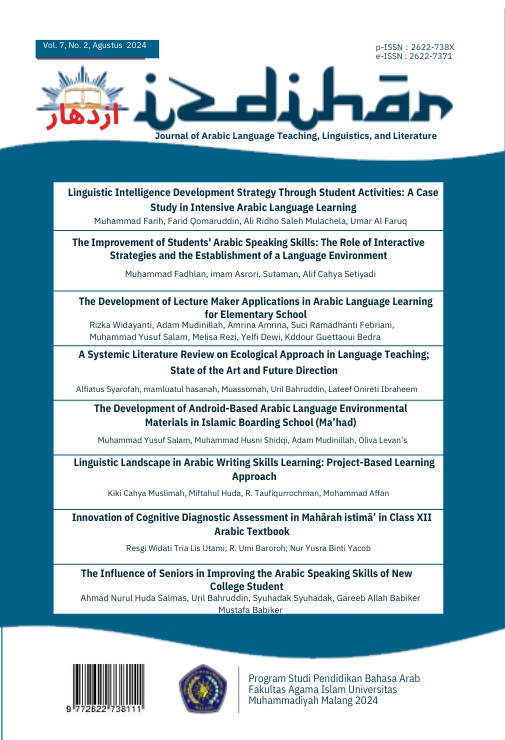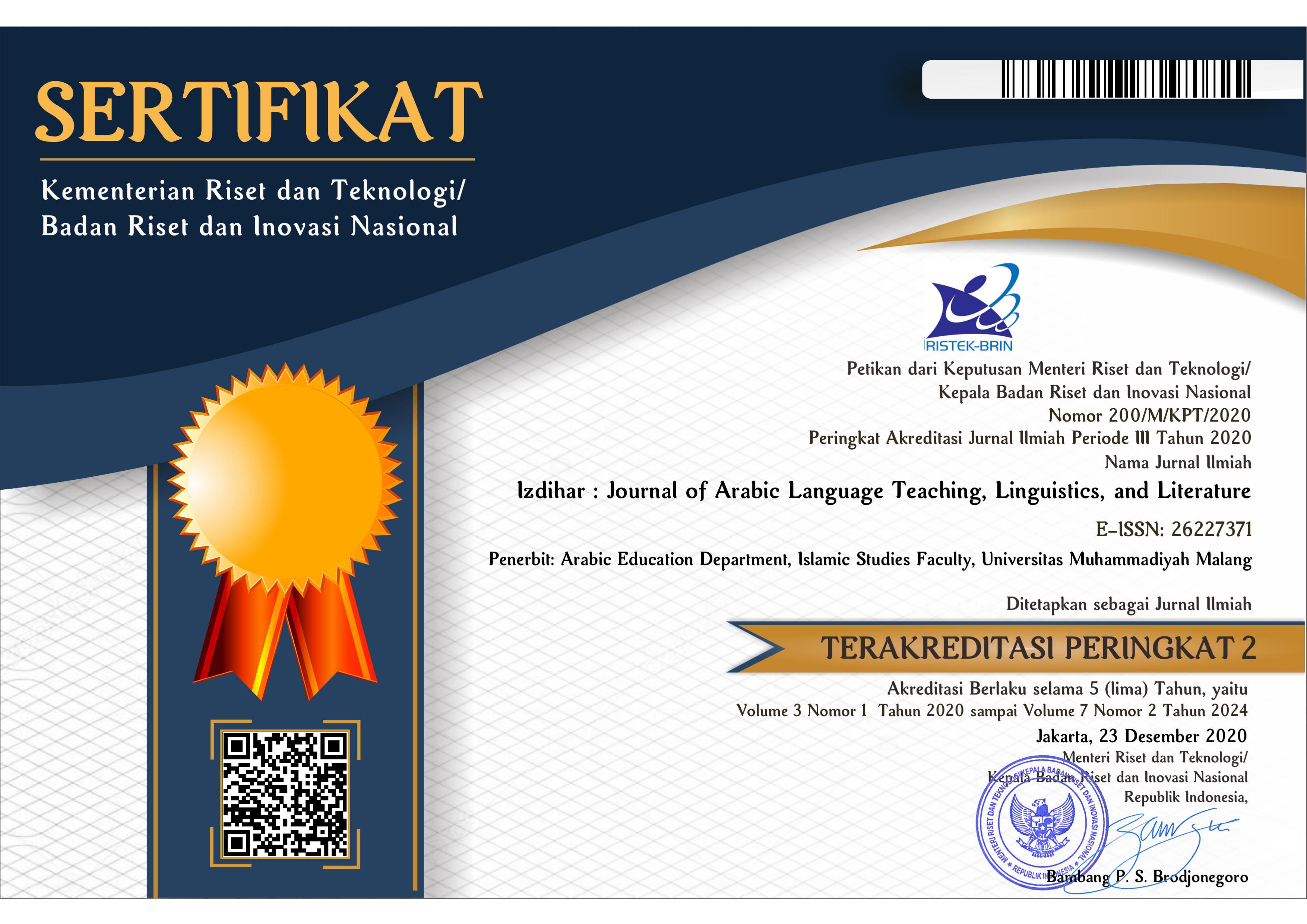A Systemic Literature Review on Ecological Approach in Language Teaching; State of the Art and Future Direction
DOI:
https://doi.org/10.22219/jiz.v7i2.34554Keywords:
Ecological approach, language learning, Systemic literature reviewAbstract
This study explored how to use ecological approach to provide more contextual and relevant learning experiences for students. The use of an ecological approach in language learning is systematically reviewed in this work using a comprehensive literature review methodology. The review process is methodologically designed as a result of these processes adhering to a clear and transparent framework. The 35 articles found are then selected by inclusion and exclusion categories to produce 7 articles for analysis according to the literature review focusing on language learning both internally and externally. Key findings from the selected studies are examined to acquire a thorough grasp of the impact of ecological techniques in language learning environments. The findings of the analysis demonstrate that an ecological approach to language acquisition has the potential to significantly improve students' learning experiences by using an inclusive, responsive, and holistic approach.
Downloads
References
Adolph, K. E. (2020). An Ecological Approach to Learning in (Not and) Development. Human Development, 63(3–4), 180–201. https://doi.org/10.1159/000503823
Barlian, E., & Yunhendri Danhas, S. P. (2022). Konsep & Aplikasi Ekologi Manusia. Deepublish.
Bestelmeyer, S. V, Elser, M. M., Spellman, K. V, Sparrow, E. B., Haan-Amato, S. S., & Keener, A. (2015). Collaboration, interdisciplinary thinking, and communication: new approaches to K–12 ecology education. Frontiers in Ecology and the Environment, 13(1), 37–43.
Brymer, E., & Davids, K. (2013). Ecological dynamics as a theoretical framework for development of sustainable behaviours towards the environment. Environmental Education Research, 19(1), 45–63. https://doi.org/10.1080/13504622.2012.677416
Button, C., Seifert, L., Chow, J. Y., Davids, K., & Araujo, D. (2020). Dynamics of skill acquisition: An ecological dynamics approach. Human Kinetics Publishers.
Chikwanda, N. N. S. (2020). Learner-centred practices in primary school human ecology classrooms: a case of selected schools in chankhanga zone, kasungu district. Mzuzu University.
Deakin Crick, R., McCombs, B., Haddon, A., Broadfoot, P., & Tew, M. (2007). The ecology of learning: factors contributing to learner‐centred classroom cultures. Research Papers in Education, 22(3), 267–307. https://doi.org/10.1080/02671520701497555
Hiver, P., & AL‐HOORIE, A. L. I. H. (2016). A dynamic ensemble for second language research: Putting complexity theory into practice. The Modern Language Journal, 100(4), 741–756.
Khan, K. S., Kunz, R., Kleijnen, J., & Antes, G. (2003). Five steps to conducting a systematic review. Journal of the Royal Society of Medicine, 96(3), 118–121. https://doi.org/10.1258/jrsm.96.3.118
Kramsch, C. (2008). Ecological perspectives on foreign language education. Language Teaching, 41(3), 389–408. https://doi.org/10.1017/S0261444808005065
Kramsch, C., & Vork Steffensen, S. (2008). Ecological Perspectives on Second Language Acquisition and Socialization. Encyclopedia of Language and Education, 8, 2595–2606. https://doi.org/10.1007/978-0-387-30424-3_194
Lemke, J. L. (2002). Language development and identity: Multiple timescales in the social ecology of learning. Language Acquisition and Language Socialization: Ecological Perspectives, 68–87.
Lier, L. Van. (2010). The ecology of language learning: Practice to theory, theory to practice. In Procedia - Social and Behavioral Sciences (Vol. 3, pp. 2–6). https://doi.org/10.1016/j.sbspro.2010.07.005
Mbete, A. M. (2017). Pembelajaran Bahasa Berbasis Lingkungan: Perspektif Ekolinguistik. RETORIKA: Jurnal Ilmu Bahasa, 1(2), 352–364. https://doi.org/10.22225/jr.1.2.40.352-364
Mujahidah. (2015). Implementasi Teori Ekologi Brofenbrenner Dalam Membangun Pendidikan Karakter yang Berkualitas. Lentera, 19(2), 171–185.
Naveh, Z., & Lieberman, A. S. (2013). Landscape ecology: theory and application. Springer Science & Business Media.
Poudel, P. P., & Baral, M. P. (2021). Examining foreign language teaching and learning in Nepal: An ecological perspective. Journal of World Languages, 7(1), 104–123. https://doi.org/10.1515/jwl-2021-0006
Rai, V. S. (2021). Ecological Approach to the Second Language (L2) Teaching and Nepali English Teachers. Studies in ELT and Applied Linguistics, 1(1), 71–78. https://doi.org/10.3126/seltal.v1i1.40608
Rajablou, F., & Shirvan, M. E. (2017). Iranian English Language Learners’ Attitude towards their Accent in English Language: An Ecological Approach. Englishes in Practice, 4(1), 1–30. https://doi.org/10.1515/eip-2017-0001
Roberts, F. (2009). Purdue University滞在記. Journal of the Atomic Energy Society of Japan, 51(6), 503–503. https://doi.org/10.3327/jaesjb.51.6_503
Saksono, H., Khoiri, A., Dewi Surani, S. S., Rando, A. R., Setiawati, N. A., Umalihayati, S., KM, S., Ali, I. H., MP, M. E., & Adipradipta, A. (2023). Teori Belajar dalam Pembelajaran. Cendikia Mulia Mandiri.
Shi, E. (2005). Ecology of Language Acquisition. Studies in Second Language Acquisition, 27(04). https://doi.org/10.1017/s0272263105330282
Tudor, I. (2003). Learning to live with complexity: Towards an ecological perspective on language teaching. System, 31(1), 1–12. https://doi.org/10.1016/S0346-251X(02)00070-2
Van Lier, L. (2012). Ecology of language learning. The Routledge Encyclopedia of Second Language Acquisition, 198–200.
Wang, G. (2023). iranian. Education Journal, 12(4), 175–183. https://doi.org/10.11648/j.edu.20231204.19
Wuryaningrum, R. (2022). Ekologi Sosiokultural Pembelajaran Wacana dalam Konteks Lingkungan Pertanian Industrial. … Seminar Nasional Bahasa, Sastra, Dan Seni. http://journal.unj.ac.id/unj/index.php/prosiding_fbs/article/view/31173%0Ahttps://journal.unj.ac.id/unj/index.php/prosiding_fbs/article/download/31173/13879
Yasida, K. S. (2020). Eco-Pedagogy. Historika Journal, 23(1), 70–79.
Published
How to Cite
Issue
Section
License
Copyright (c) 2024 Alfiatus Syarofah, mamluatul hasanah, Muassomah, Uril Bahruddin, Lateef Onireti Ibraheem

This work is licensed under a Creative Commons Attribution-ShareAlike 4.0 International License.
Copyright Notice
Authors who publish with this journal agree to the following terms:
- Authors retain copyright and grant the journal right of first publication with the work simultaneously licensed under a Creative Commons Attribution-ShareAlike 4.0 International License that allows others to share the work with an acknowledgment of the work's authorship and initial publication in this journal.
- Authors are able to enter into separate, additional contractual arrangements for the non-exclusive distribution of the journal's published version of the work (e.g., post it to an institutional repository or publish it in a book), with an acknowledgment of its initial publication in this journal.
- Authors are permitted and encouraged to post their work online (e.g., in institutional repositories or on their website) prior to and during the submission process, as it can lead to productive exchanges, as well as earlier and greater citation of published work (See The Effect of Open Access).
Copyright (c) 2019 Izdihar : Journal of Arabic Language Teaching, Linguistics, and Literature

This work is licensed under a Creative Commons Attribution-ShareAlike 4.0 International License.


















